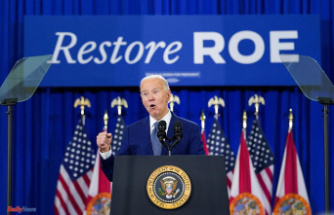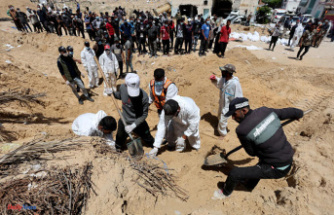According to information obtained by the BBC, a series of failures led to chaos at Paris' Champions League final. It discovered evidence of software problems in Uefa's digital tickets, as well as poorly-trained stewards. Both of these contradict French authorities' claims.
Match officials and ministers of government have blamed the chaos so far on fake tickets from Liverpool fans, a transport strike and local troublemakers who broke into Stade de France.
They must also answer deeper questions about valid tickets, the profiles of stewards who were faced with unmanageable crowds, and the engagement of politicians long before troublemakers arrived on the ground.
Steve Golley was an IT expert and was spotted in the crowd at the stadium's Gate G with his partner Selina.
He stated that the holdup was not caused by fake tickets but rather by issues with Uefa’s mobile app QR codes for digital tickets.
He said, "The area was filled with people, shoulder-to-shoulder." "I saw many people reaching for their smartphones to activate their QR codes. The QR code of my partner activated, and it was the only one that I could see in all of the dozens of others. Mine didn't."
French officials and ministers have refuted their estimate that there were 30,000 fake tickets at this game. They stated last month that 2,500 of these tickets had been detected at the turnstiles. They maintain that they were still high-quality fake tickets by normal standards and played a crucial role in the confusion.
A Senate inquiry was told by match organizers that any issues with "un-fakeable digital tickets" were due to fans not turning on their Bluetooth as instructed.
Steve, who has written several apps, stated that he followed the instructions to the letter. However, the QR code required to scan the ticket through turnstiles with the ticket scanner didn't show up.
He said that he believes there is a problem with the application. Connectivity issues were resolved by the latest update. This was a few days prior to the match. We had connectivity problems when we reached the match.
Ronan Evain from Football Supporters Europe agrees that it was difficult to scan valid tickets through the turnstiles on both sides.
Ronan said that there were already huge queues at 6.30pm on Real Madrid's side. "I saw a lot people scanning tickets three, four and five times. My interpretation is that there was an issue at the turnstiles and a particular issue with scanning the app.
However, the severe bottlenecks at the Liverpool side's turnstiles were caused by the decision to suspend preliminary ticket check further back to alleviate crowd pressure at the southern entrance of the concourse.
Ronan explained that stewards were to activate digital tickets at these initial checkpoints using a swipe-card.
He said, "The moment the check was lifted on Liverpool's side, a lot fans arrived at the turnstiles with no activated tickets." "And the ticket had to manually be activated by stewards, which takes about 10-15 seconds each time.
He said that the situation at the turnstiles was already "extremely messy" at that time, and that the long wait to activate tickets only made it worse.
We asked Uefa about connectivity problems in their technology and contingency plans for activating tickets in case of problems. They declined to comment as their investigation into the Stade de France was ongoing.
Match officials and train companies blame each other for mismanaging the rail strike that occurred on the day before the match. This caused crowds to be pushed to an access point that was too small to handle them and created a bottleneck that made it impossible to conduct preliminary checks.
Ronan Evain was present at the affected entry point on that day to observe the stewards.
He said that he thought it was their age that was most striking. "Extremely young students just out of highschool, not very well-trained. Some students were reacting and feeling panic, pushing back against the crowd in ways that weren't helpful.
They were often the first to be greeted by fans.
Ronan stated that there were "serious flaws" in the entire setup. "Stewarding requires more than a license and training. It requires the ability read crowds and the ability assess risks. It's misleading to say that everything went well with stewarding.
Ronan, who has viewed more than 20 matches at the Stade de France football stadium, concluded that there was a shortage of qualified personnel on the Champions League final night, and in general.
We have reported his claims to the French Football Federation.
Didier Pinteax (FFF's head for security) told a Senate inquiry that the FFF had hired nearly 1,700 security agents from private security firms to serve as stewards and conduct initial ticket checks. The FFF stated that all of its security agents had received a professional certificate and training on-site with equipment.
Stephane Boudon heads the National Union for Security Staff. Many of its members served as stewards on that night.
He explained that there is no training for stewards and the job is not recognized in France's security codes. "But, to become a security agent you must have a professional card that has been approved by the Interior Ministry. Did they have enough checks to verify that everyone had their cards? That's something I don't know."
Nearly no one working as a steward on that night wanted us to record their conversation, but one man did. To hide his identity, he asked us to call him Sam. We confirmed that he was at the Stade de France the night of the match.
Sam recalled that "from hours before the match there were riots all over," "There were injuries to colleagues and fans, there was damage. We realized quickly that we were going be overwhelmed."
Sam was trying to protect a parking lot that led to the stadium. He said that staff were being threatened by large numbers of "hostile individuals", and that he saw a local troublemaker violently mug an English supporter. He claimed that he intervened twice on separate occasions to stop sexual assaults against fans.
He said, "I know many people who were stewards at the Stade de France or VIP security guards there, but have no security training or certification."
He added that some of his colleagues were on their very first assignment and had been recruited only 24 hours prior to the Champions League final.
Covid pandemic has caused many companies to have difficulty recruiting security personnel from France. To make ends meet, guards often depend on extra work at sporting events. When those activities stop in lockdown they switch to other jobs.
Stephane Boudon stated that companies have less people to choose from. "The fact that France did not plan to host the Champions League final has caused more recruitment problems, with security companies asking for workers much later."
Senator Patrick Kanner said that if it was a normal period, then we would have been fully prepared." "But it was election time, and the Interior Minister may have had other concerns than investing in the organization of this event."
Senator Kanner, a Socialist opposition member, stated that he had "lost count" on the number of meetings he presided over as Sports Minister during 2016 Euro Championships in France. "To make sure every possible was imagined."
He said that he believed in the presence ministers. "I don’t believe Gerald Darmanin, the Interior Minister, presided over any meetings, and I know that the Sports Minster did."
The Senate will publish its report on the events at Stade de France later this week. Senator Kanner stated that the process of uncovering the truth was made more difficult by the loss video surveillance footage from the stadium and train network. This was because there wasn't a judicial request for it to be preserved.
He said that no one had requested the images. I'm not saying that there is a conspiracy. I am not a conspiracy theorist. It's still curious to me that images from 220 cameras were removed when they could have been used for the truth.
Although a definitive narrative is emerging around that one night in Paris, deeper questions remain.
Some in this country are concerned that the Rugby World Cup is only 14 months away and the Olympic Games are 24 months away.












